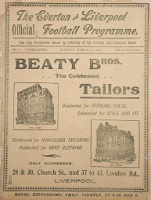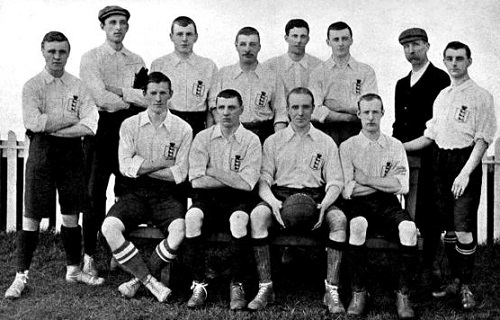|
 Despite the importance of the game and the continuance of really beautiful
weather, not more than 20,000 turned out to witness the international
match between England and Wales at Anfield-road, Liverpool, yesterday
afternoon. The Mersey city is one of the greatest football centres in the
kingdom, but its enthusiasts have had an overdose of the game recently,
whilst, of course, the fact that it was a mid-week event militated against
the attendance. The Welsh element was, however, a strong force—no doubt
in the hope of seeing England worse confounded that had been Scotland at
Wrexham three weeks ago. In that they were disappointed, for the English
eleven were returned the winners by three goals to one. At least the
Welshmen need admit to no great inferiority. Eight minutes from time the
score stood at one goal each, and at the moment few of the spectators
would have asserted thus far England had been the better team. The game
will rank as one of the poorest of internationals, and upon their display
the prospect of the Englishmen against Scotland at the Crystal Palace on
Saturday next would be very poor but for the inconsistent form the Scots
have themselves been showing. The work of the home team was not entirely
satisfactory in any department, but it was the forwards who were mostly at
fault. S. Harris was at once the best shot and the worst forward on the
field, however, contradictory the statement may appear. Whenever he shot
he did so with speed and precision, and generally contrived to aim low,
but on other occasions his hesitancy in front of goal was painfully
apparent, he being robbed time after time; and his play in the open was
execrable. Under the circumstances, H. P. Hardman might have been excused
an indifferent display, but he shone resplendently throughout, being at
once the best and the most effective forward in the side. Woodward played
one of his best games in centre without being over dashing, the way he
opened out the game being admirable. Bloomer did not get along together at
all well on the right wing, but this was due not so much to their
individual shortcomings as to the remarkably fine defensive play of
Charles Morris and the two Hughes.
Despite the importance of the game and the continuance of really beautiful
weather, not more than 20,000 turned out to witness the international
match between England and Wales at Anfield-road, Liverpool, yesterday
afternoon. The Mersey city is one of the greatest football centres in the
kingdom, but its enthusiasts have had an overdose of the game recently,
whilst, of course, the fact that it was a mid-week event militated against
the attendance. The Welsh element was, however, a strong force—no doubt
in the hope of seeing England worse confounded that had been Scotland at
Wrexham three weeks ago. In that they were disappointed, for the English
eleven were returned the winners by three goals to one. At least the
Welshmen need admit to no great inferiority. Eight minutes from time the
score stood at one goal each, and at the moment few of the spectators
would have asserted thus far England had been the better team. The game
will rank as one of the poorest of internationals, and upon their display
the prospect of the Englishmen against Scotland at the Crystal Palace on
Saturday next would be very poor but for the inconsistent form the Scots
have themselves been showing. The work of the home team was not entirely
satisfactory in any department, but it was the forwards who were mostly at
fault. S. Harris was at once the best shot and the worst forward on the
field, however, contradictory the statement may appear. Whenever he shot
he did so with speed and precision, and generally contrived to aim low,
but on other occasions his hesitancy in front of goal was painfully
apparent, he being robbed time after time; and his play in the open was
execrable. Under the circumstances, H. P. Hardman might have been excused
an indifferent display, but he shone resplendently throughout, being at
once the best and the most effective forward in the side. Woodward played
one of his best games in centre without being over dashing, the way he
opened out the game being admirable. Bloomer did not get along together at
all well on the right wing, but this was due not so much to their
individual shortcomings as to the remarkably fine defensive play of
Charles Morris and the two Hughes.
The English halves were equally sound, without being brilliant, and
taking the game throughout they were the most consistent line in the
field. Spencer's judgment and Hebert Smith's powerful kicking were greatly
admired, but neither of the backs impressed one as being equal to a
first-class attack, Meredith and, at times, Oliver outpacing them with
ease. On the Welsh side Roose in goal was very safe, and at times cleared
in miraculous fashion. He was not to blame for any of the goals, though
curiously enough he was the last to touch the ball in regard to two of
them. Of the backs Morris was easily the better, Jones, of Notts Forest,
who took the place of H. Blew, being far too slow to cope with Hardman.
The Tottenham Hughes was the pick of the fairly good half-back line,
Lathom, of Liverpool, who substituted Parry, being the weakest. The
forwards were better balanced than their vis-a-vis, and consequently more
difficult to cope with, but Oliver was not quite of the same class as the
others, whilst Lot Jones, of Manchester City, who played instead of
Atherton, was good and bad in turn. Meredith, the Welsh Bloomer, played up
to his very high reputation, and his beautiful centres been taken
advantage of Wales would probably have won. It will be gathered that the
visitors had to make three changes in the constitution of their eleven,
Blew, Parry, and Atherton—three rare players—being absent due to injuries,
and no doubt were greatly missed.
England gained a big advanatge in
winning the toss, for not only was the wind blowing rather strongly almost
from goal to goal, but a powerful sun shone brilliantly in the same
direction. It was, therefore, strange to see Wales doing the initial
attacking. Once they were beaten back, without having been dangerous, the
English stayed at the other end some time, Woodward first shooting feebly,
but Harris following immediately with a great effort, which Roose gained
rounds of applause for clearing strongly. Hardman sent wide with a shot
almost as speedy, and then Bloomer placed the ball in the net, after he
had been declared offside. Harris was twice wide in the same minute, with
furious attempts, and Bloomer was again offside as he shot over, Meredith
experiencing similar luck at the other end without being penalised. Then
Morris thrilled the crowd with a lightning flash across the goal-mouth,
which Linacre could not have seen. The English custodian saved from
Meredith, and for England Harris struck the bar with Roose in the air. A
neat pass by Oliver gave G. Morris a chance, but he was just wide, and the
interval arrived without score, just as Roose had saved grandly from
Harris.
In the second half the Englishmen had even more
sunshine to contend with than had Wales in the first, but they were the
first to make an invasion, and Hughes heading into his own goal, Roose
fisted out almost into midfield. Eleven minutes of the half and fifty-six
in all had done by when the first goal came along. Hardman raced down the
left, and crossed to Bloomer, who placed forward for Bond to struggle for
possession. The Preston youth for once got the better of Morris, and
touching into goal, all that Woodward had to do was to push the ball past
Roose in the mouth . Directly from the centre, Hardman gained possession,
and he drove splendidly, Roose turning the ball behind with a touch of the
foot at full stretch. Then Lathom and Hardman collided, the former clearly
fouling. Both were cut, but Lathom rather badly over the eye and Hardman
on his head. Lathom retired for attention, but he was back in a few
minutes, in time to see Morris equalise for his side as the result of a
brilliant effort by Meredith, who outpaced both Leake and Smith, and
centred perfectly for the Nottingham forward to fire strongly past
Linacre. Again Meredith got off, and again he centre to an inch, but
this time—with the most glorious opening of the game—Watkins lifted the ball
skywards and tried to hide himself in the earth for his rashness. It
was the Welshman's last chance, for after Roose had saved miraculously
from Woodward, Hardman, at the end of thirty-seven minutes, took the ball
away from Jones and placed swiftly to Harris, who, in shooting, must have
spun the ball at the two yards' range, for it struck Roose's leg, and
curled into the net. Meredith made one dying effort for Wales, but
received no support, and after Bloomer had made a bold bid for his usual
international goal, and had been denied, Woodward rather luckily obtained
England's third point just on time.
To be beaten so late
in the game Wales were most unlucky, and if England were, perhaps,
entitled to the verdict of a disappointing game, it was only by the
narrowest of margins.
|